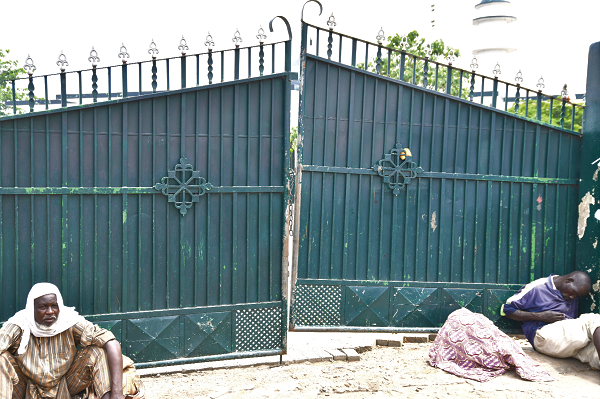
Some Mosques remain closed, despite ease of restrictions
Major mosques around the country remained closed to congregants, despite the government’s decision to ease restrictions on religious gatherings.
The decision to keep the mosques closed followed a directive from the Office of the National Chief Imam to hold on with Jummah prayers in all major mosques
Advertisement
Daily Graphic reporters across the country report that beyond the directive from the Chief Imam, some of the mosques had not undergone disinfection and fumigation, which are prerequisites for the easing of the restrictions, as a result of which they did not open for Friday prayers yesterday.
Mosques that opened ensured that all directives on the COVID-19 preventive measures were followed to the letter, with some devotees who wanted to enter those mosques after the 100th person had entered being turned away.
Alhashin Mosque
In Accra, Justice Agenorsi reports that major mosques in the metropolis were closed.
For instance, the Central Mosque at Abossey Okai was closed to Muslim congregants when the Daily Graphic visited the place.
However, at the Alhashin Mosque in Adabraka, popularly known as the 2000 Mosque, congregants were allowed into the facility to observe the Jummah prayers, with access being restricted to only 100 people, in line with the President’s directive.
It was also observed that all the prescribed precautionary measures, including the COVID-19 protocols, were observed.
Some worshippers stayed nearby and followed the prayers from the mosque’s loud speakers.
The Imam, Sheikh Salman Mohammed Alhassan, said the mosque had been fumigated.
Koforidua
From Koforidua in the Eastern Region, George Folley reports that the premises of the Koforidua Central Mosque, which had been a scene of activities prior to the outbreak of the COVID-19 pandemic, was dead silent as a result of the directives.
Instead, Muslims in the New Juaben municipality observed their prayers in their communities where smaller mosques are a common feature.
Tamale
The situation in Tamale was not different, with Samuel Duodu reporting that the Jummah prayers were not observed in all mosques in the metropolis, although it is a predominantly Muslim area.
The Spokesperson for the Northern Regional Chief Imam, Alhaji Mohammed Gazali Yakubu, said the decision not to hold the prayers was taken at a meeting with all Imams in the area because they could not follow all the 23 guidelines.
Kumasi
Kwadwo Baffoe Donkor reports from Kumasi in the Ashanti Region that it was all joy for Muslims who congregated and worshipped together after almost 12 weeks of break.
The prayers were led by the Ashanti Regional Chief Imam, Sheikh Abdul Mumin Harun, who thanked the government, especially the President, for easing the ban on religious activities.
He said the leadership would continue to adhere to the safety protocols as announced by President Akufo-Addo and advised all Muslims to follow the protocols to stop the spread of the virus.
Sunyani
Muslims in the Bono Region could not observe the Jummah prayers because the various mosques had not been disinfected and fumigated in accordance with the government’s directive, Biiya Mukusah Ali reports from Sunyani.
Almost all the mosques in the Sunyani municipality, including the Central Mosque, were closed.
When contacted, an aide to the Bono Regional Chief Iman, Alhaji Suallah Abdallah, explained that they wanted the disinfection to be carried out before resuming prayers.
He said discussions had been held with Zoomlion Ghana Limited to disinfect and fumigate about 30 major mosques in the municipality.



